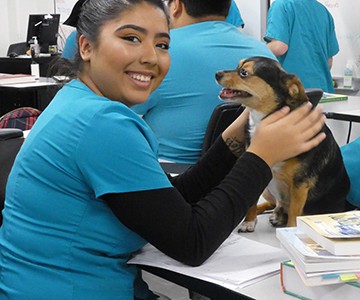Should I train to work as a Veterinary Technician?
Editor’s Note: This article was edited on November 9, 2021 to include updated BLS data.
 Do you enjoy working with animals as much as people? Do you want a career that has a mix of medicine, compassion, and dedication? Do you want to be the link between the veterinarian, animal, and client? If so, then becoming a veterinarian technician may be the right career path for you.
Do you enjoy working with animals as much as people? Do you want a career that has a mix of medicine, compassion, and dedication? Do you want to be the link between the veterinarian, animal, and client? If so, then becoming a veterinarian technician may be the right career path for you.
What does a Veterinary Technician do?
Veterinary technicians assist in diagnosing animal illnesses and injuries by performing medical tests under the supervision and guidance of a licensed veterinarian. According to U.S. News & World Report, veterinary technicians are tasked with handling lab work, nursing care, radiology, assisting in surgeries and many other tasks related to animal health care. A veterinary technician is essentially what a nurse is to a doctor.
According to the Bureau of Labor Statistics (BLS), veterinary technicians typically do the following:
- Observe animals’ conditions and behaviors
- Provide emergency first aid care to sick and injured animals
- Groom the animals, which includes bathing them, clipping their nails or claws, and brushing or cutting their hair
- Restrain the animals for procedures and medical examinations
- Apply anesthesia to the animals, and observe their responses
- Take X-rays and collect and perform laboratory tests, such as urinalyses and blood counts
- Prepare all instruments and animals for surgery
- Administer treatments, medications, and vaccines prescribed by a veterinarian
Why should I become a Veterinary Technician?
According to U.S. News & World Support, veterinary technologists and technicians ranked #20 in Best Health Care Support Jobs. This ranking is based on factors such as median salary, unemployment rate, 10-year growth, stress, and work-life balance.
In addition, employment of veterinary technologists and technicians is projected to grow 15 percent from 2020 to 2030, much faster than the average for all occupations, according to the BLS. With the increase in the number of households with pets, as well as spending on pets, there is going to be an increase in the demand for veterinary technicians to perform lab work and other services on household pets.
Also, in California, the demand and pay for veterinary techs is very promising and is among the best in the United States. The BLS shows that California has the third highest employment level with 8,950 estimated jobs, and also ranks fourth in pay, with an annual mean wage of $47,580.
Where do Veterinary Technicians work?
Veterinary technicians will usually work in animal hospitals and private clinics. They may also be working at colleges, universities, humane societies, and laboratories, the BLS reports.
Is a career as a Veterinary Technician right for me?
Working with animals can be very rewarding but it’s also hard work. The work of a veterinary technician isn’t as glamorous as it might seem. Picking up feces and getting urinated on by animals is something that vet techs will have to get used to.
According to The Balance, you may be bitten or injured by a frightened or aggressive animal. You’ll also have to work with abused and severely injured animals and help veterinarians when they euthanize animals. Since many clinics and labs are staffed 24 hours a day, vet techs are expected to be able to work evenings, weekends, or holidays.
There are also important qualities that vet techs must possess. According to the BLS, these qualities are:
- Communication skills. Veterinary technicians will spend a significant amount of time communicating with their supervisors, staff members, and animal owners, so they must possess strong communication skills. Vet techs also will counsel pet owners on nutrition and their animals’ behavior.
- Compassion. Veterinary technicians need to be sympathetic when dealing with the owners of sick pets as well as be able to treat the animals with kindness and compassion.
- Detail-oriented. Veterinary technicians need to have strong attention to detail and be precise when administering medication, performing diagnostic tests, and recording information.
- Manual dexterity. Doing intricate tasks, such as administering anesthesia, dental work and taking X-rays, requires steady hands. Veterinary technicians must also be able to handle animals, medical instruments, and laboratory equipment with attention and care.
- Problem-solving skills. In order to provide the appropriate treatments for injuries and illnesses, veterinary technicians need to have strong problem-solving skills to identify the causes of the problem and be able to fix it.
- Physical strength. Veterinary technicians need to be able to manage and lift animals.
If you’re looking for a career where you get to play with animals, then this isn’t the career choice for you. Being a veterinary technician is for those with a real commitment to taking care of animals and isn’t something to be taken lightly.
Do I need to be licensed and certified to work as a Veterinary Technician?
According to the American Association of Veterinary State Boards, most states require a passing score on the Veterinary Technician National Examination (VTNE) in order for a veterinary technician to be credentialed. In the state of California, you must pass both the Veterinary Technician National Examination and the California Veterinary Technician Examination.
The Veterinary Technician National Examination (VTNE) is an exam administered by the American Association of Veterinary State Boards. The California Veterinary Medical Board administers licensure, and continuing education. Exams are computer-based and administered throughout the state.
To keep your license current, 20 hours of continuing education (CE) are required annually to keep your license current. 16 of the 20 hours must be taken from approved CE providers; four hours can be accomplished through self-study.
How do I start my training to become a Veterinary Technician?
In order to become a Veterinary Technician, the first step is to enroll in a veterinary technology program at an accredited college or university.
SJVC’s Veterinary Technology program can train you to help animals. Our in-depth training covers all areas of animal patient care, from lab tests to radiology and surgical procedures.
Students in SJVC’s program can earn an Associate of Science degree in Veterinary Technology in as few as 19 months. Our Veterinary Technology graduates are immediately eligible to work as a Veterinary Assistant. The program holds full accreditation by the American Veterinary Medical Association (AVMA), qualifying graduates to sit for the Veterinary Technician National examination (VTNE) after graduation. Upon successful completion of the VTNE, graduates are eligible to obtain state licensure and work as a Registered Veterinary Technician (RVT). For more information, please visit www.vmb.ca.gov.
Request more information or call 866-544-7898 to speak with an admissions advisor about SJVC’s Veterinary Technology Program.
You might also like
More stories about
Request Information
All fields using an asterik (*) are required.

